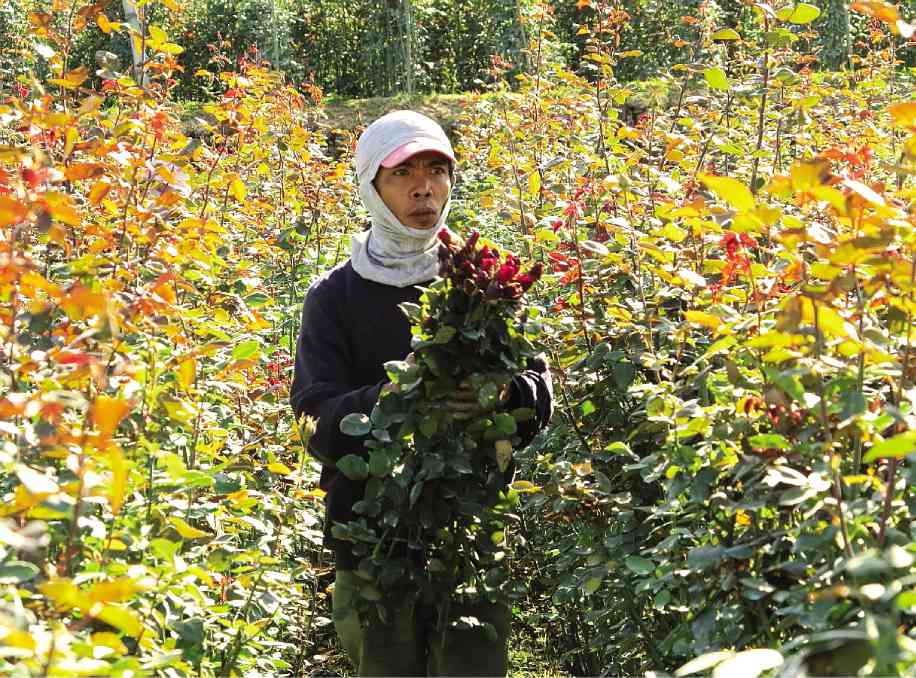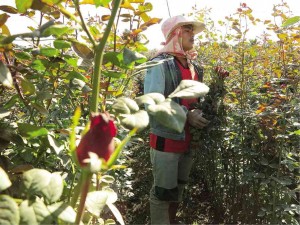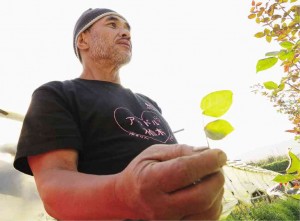Benguet ‘rose capital’ finds ways to keep blooming

FARMERS from Bahong village in the Benguet town of La Trinidad harvest roses in time for Valentine’s week. Bahong and other villages in La Trinidad are famous for their rose production. EV ESPIRITU/INQUIRER NORTHERN LUZON
LA TRINIDAD, Benguet— While most women look forward to receiving red roses this Valentine’s Day, Juliet Bentrez, a farmer in La Trinidad town in Benguet province, would rather receive chocolates.
“I would rather that my husband give me chocolates,” said Bentrez, a rose farmer in the village of Bahong. “I would be more thrilled if he gives me cash,” she said, while breaking into laughter.
Bentrez and her husband grow roses on about a hectare of land in five different locations in Bahong, considered the “rose capital” of the province.
“We are so used to roses here (Bahong) that it has become too common already,” she said.

FARMERS from Bahong village in the Benguet town of La Trinidad harvest roses in time for Valentine’s week. Bahong and other villages in La Trinidad are famous for their rose production. EV ESPIRITU/INQUIRER NORTHERN LUZON
Receiving roses on Valentine’s Day or any other special occasion like Mother’s Day and the Christmas holidays seems quite funny, she noted.
Nida Organo, senior agriculturist of La Trinidad, said 635 farmers grow roses in the town and 50 percent of them work in Bahong. She said roses are also grown in the villages of Alno, Alapang and Bineng.
But farmers in Bahong are fearful that their village’s reputation as the leading rose producer in the province would be lost as more gardens are being planted to other flower varieties.
On Feb. 2, Bahong launched its first tourism week to encourage farmers to dedicate more areas to rose cultivation and at the same time draw more tourists to visit the rose gardens.
“There is still a wider area planted to roses this year but we fear that our village might lose its title as the rose capital of the province if more farmers would change their product,” said Belmer Elis, Bahong village councilor and chair of the village’s tourism committee.
Each farmer in Bahong plants roses on an an average of 1,500 square meters of garden. During the peak season, like February, flower traders buy roses at a wholesale price of P600 to P700 a bundle (a bundle has two dozen stems).
Bentrez said roses need TLC (tender loving care) and more attention compared to other cut flowers. Roses, she said, are sensitive to changes in temperature and are easily infested with pests.
“Unlike Malaysian mums, we need to check on roses almost every day, water them, prune them and spray them [with insecticides] so they would produce the best flowers,” she said.
She said they need to spray insecticides every four days to ensure that the buds and flowers would not be eaten by pests. “We use the more expensive insecticide brand if we want exquisite red roses,” she said. Her one-hectare farm needs five bottles of insecticides for a spraying session and each 500-milliliter bottle costs P1,850.
“Roses do not want extreme temperatures—very cold or very warm—maybe that is why they grow well here in Bahong because unlike other areas in the province, it is not that cold here,” she said.
Gonzalo Kisse, another Bahong rose farmer, said roses thrive well outdoors than in greenhouses. “Of course, it is a different story if you talk about the expensive, high-end greenhouses that other countries use. We cannot afford that technology here in Bahong,” he said.
“In Bahong, greenhouses are simply makeshift covers made out of plastic sheets supported by bamboo. These have no temperature controls similar to modern greenhouses,” he said.
Since they are not in greenhouses, roses are vulnerable to changes in temperature, pests and weather disturbances, he said.
Kisse said the drop in temperatures in the Cordillera in January worried farmers as this delayed the flowering of roses.
Elis said some farmers opted to limit accepting bulk orders from their regular clients in Metro Manila, despite the high demand for Valentine’s Day, as they do not want to lose money due to the unpredictable weather.
Village officials said they have been observing a decrease in the land area planted to roses because many farmers, especially those in Upper Bahong, had planted portions of their farms with Malaysian mums this year.
Organo said that in 2008, the total land area planted to roses was estimated at 200 hectares in Bahong, Alno, Alapang and Bineng. The area, however, was reduced to 160 ha in 2013.
Kisse said he planted some sections of his garden with Malaysian mums and these have been reserved for a buyer who would use them for the Panagbenga (Baguio Flower Festival).
“I still plant roses but I also venture in other cut flowers because roses are harder and more expensive to maintain,” he said.















